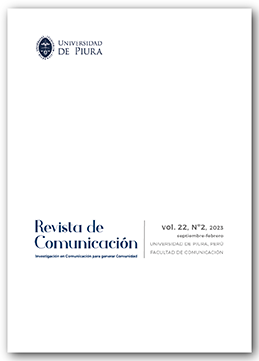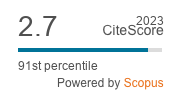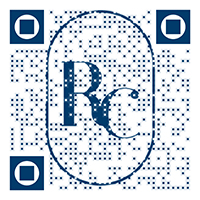Checking the fact-checker. Political verification practices and partisan bias in Newtral (Spain)
DOI:
https://doi.org/10.26441/RC22.2-2023-3184Keywords:
Disinformation, Fact-checking, Verification, Ideological bias, Partisan bias, Political communication, Political discourse, Fake news, NewtralAbstract
In recent years, fact-checking journalism has become one of the dominant strategies to tackle disinformation. For these entities to be effective and gain the trust of citizens, it is essential that they carry out their work under the principles of ideological neutrality, especially when they try to verify political discourse. This paper, groundbreaking in the Spanish context, aims to analyze the verification practices and possible partisan biases of political fact-checking in Spain through a specific study applied to Newtral, the main fact-checker specialized in politics in this country. The political verification practices used by this fact-checker since the beginning of its activity (October 2018-October 2022) were analyzed through quantitative content analysis. In a second phase, the same study was replicated, applied only to the discourse of the main national political leaders. The study used inferential statistics (chi-square hypothesis tests, correlational studies, Kruskal-Wallis test and Mann-Whitney U test). No significant differences were observed between political parties in any of the variables analyzed in the phases of execution and verdict, neither in the general sample nor in the specific sample related to political leaders. However, greater attention is paid to the statements made by politicians belonging to Partido Popular, whose discourse is more checked, which could indicate a certain selection bias.
Metrics
References
Abuín-Penas, J. (2023). Fact-Checking en Youtube en España: tipología de verificaciones en vídeo en 2021. index.Comunicación, 13(1), 247–269. https://doi.org/10.33732/ixc/13/01Factch DOI: https://doi.org/10.33732/ixc/13/01Factch
Aguado-Guadalupe, G. y Bernaola-Serrano, I. (2020). Verificación en la infodemia de la Covid-19. El caso Newtral. Revista Latina de Comunicación Social, 78, 289-308. https://doi.org/10.4185/RLCS-2020-1478 DOI: https://doi.org/10.4185/RLCS-2020-1478
Amazeen, M. A. (2013, October 8). Making a difference? A critical assessment of fact-checking in 2012. New America Foundation. https://bit.ly/3FIXlpW
Aspray, W., & Cortada, J.W. (2019). From urban legends to political fact-checking. Online scrutiny in America, 1990-2015. Springer. DOI: https://doi.org/10.1007/978-3-030-22952-8
Baptista, J.-P., Jerónimo, P., Piñeiro-Naval, V., & Gradim, A. (2022). Elections and fact-checking in Portugal: the case of the 2019 and 2022 legislative elections. Profesional de la Información, 31(6), e310611. https://doi.org/10.3145/epi.2022.nov.11 DOI: https://doi.org/10.3145/epi.2022.nov.11
Bernal-Triviño, A. y Clares-Gavilán, J. (2019). Uso del móvil y las redes sociales como canales de verificación de fake news. El caso de Maldita.es. Profesional de la Información, 28(3), e280312. https://doi.org/10.3145/epi.2019.may.12 DOI: https://doi.org/10.3145/epi.2019.may.12
Blanco-Alfonso I., Chaparro-Domínguez M.A. y Repiso R. (2021). El fact-checking como estrategia global para contener la desinformación. Estudios sobre el Mensaje Periodístico, 27(3), 779-791. https://doi.org/10.5209/esmp.76189 DOI: https://doi.org/10.5209/esmp.76189
Card, D., Lin, L.H., & Smith, N.A. (2018, March 23). Politifact Language Audit. https://bit.ly/3E2n5MK
Chen, Q., Min, C., Zhang, W., Ma, X., & Evans, R. (2021). Factors driving citizen engagement with government TikTok accounts during the Covid-19 pandemic: Model development and analysis. Journal of Medical Internet Research, 23(2). https://doi.org/10.2196/21463 DOI: https://doi.org/10.2196/21463
Damasceno, D.R., & Patricio, E. (2020). Journalism and fact-ckecking: Typification of sources used for checking and criteria for selecting fact-checked material – an analysis by Agência Lupa and Aos Fatos. Brazilian Journalism Research, 16(2), 368-393. https://doi.org/10.25200/BJR.v16n2.2020.1212 DOI: https://doi.org/10.25200/BJR.v16n2.2020.1212
Dean, M. (2017, September 20). Snopes and the search for facts in a post-fact world. Wired. https://bit.ly/3U8xDzs
Dimock, M. (2013, August 8). Amid criticism, support for media’s ‘watchdog’ role stands out. Pew Research Center. https://pewrsr.ch/3NA1C0G
Donofrio A. (2022). Política y medios en Italia: De Berlusconi a Salvini, de la televisión a las redes sociales. Estudios sobre el Mensaje Periodístico, 28(1), 81-90. https://doi.org/10.5209/esmp.79027 DOI: https://doi.org/10.5209/esmp.79027
Farnsworth, S.J., & Lichter, S.R. (2016). A comparative analysis of the partisan targets of media fact-checking: Examining President Obama and the 113th Congress. https://bit.ly/3UdP028
Ferré-Pavia, C. y Codina, M. (2022). Narrativa de campaña en Instagram: Espectáculo y autorrepresentación de candidatos. El caso de las elecciones generales 2019. Index Comunicación, 12(1), 77-98. https://doi.org/10.33732/ixc/12/01Narrat DOI: https://doi.org/10.33732/ixc/12/01Narrat
García-Marín, D. y Salvat-Martinrey, G. (2022). Viralizar la verdad. Factores predictivos del engagement en el contenido verificado en TikTok. Profesional de la Información, 31(2), e310210. https://doi.org/10.3145/epi.2022.mar.10 DOI: https://doi.org/10.3145/epi.2022.mar.10
García-Vivero, G. y López, X. (2021). La verificación de datos en Europa. Análisis de 5 iniciativas europeas: Maldita.es, Newtral, Pagella Politica, Les Décodeurs y BBC Reality Check. AdComunica, 21, 235-264. https://doi.org/10.6035/2174-0992.2021.21.12 DOI: https://doi.org/10.6035/2174-0992.2021.21.12
Gestoso, L. [@LuisGestoso] (2020, April 12). Me parece que @Newtral empieza a oler a podrido. Por ser progres y tener las teles se creen impunes. [Tweet]. Twitter. https://bit.ly/3fCnKLx
Graves, L. (2016). Deciding what’s true: The rise of political fact-ckecking in American journalism. Columbia University Press. DOI: https://doi.org/10.7312/grav17506
Herrero, E. y Herrera-Damas, S. (2021a). El fact-checker en español alrededor del mundo: Perfil, similitudes y diferencias entre verificadores hispanohablantes. Revista de Comunicación de la SEECI, 54, 49-77. https://doi.org/10.15198/seeci.2021.54.e725 DOI: https://doi.org/10.15198/seeci.2021.54.e725
Herrero, E. y Herrera-Damas, S. (2021b). El fact-checking hispanohablante: competencias, dificultades y propuestas de mejora desde la perspectiva de sus profesionales. Profesional de la Información, 30(6), e300612. https://doi.org/10.3145/epi.2021.nov.12 DOI: https://doi.org/10.3145/epi.2021.nov.12
Li, Y., Guan, M., Hammond, P., & Berrey, L.E. (2021). Communicating Covid-19 information on TikTok: A content analysis of TikTok videos from official accounts featured in the Covid-19 information hub. Health Education Research, 36(3), 261-271. https://doi.org/10.1093/her/cyab010 DOI: https://doi.org/10.1093/her/cyab010
Liu, Y., & Zhou, R. (2022). “Let’s check it seriously”: Localizing fact-checking practice in China. International Journal of Communication, 16, 4293-4315. https://bit.ly/3fEBUeX
López-Pan, F. y Rodríguez-Rodríguez, J. M. (2020). El Fact Checking en España. Plataformas, prácticas y rasgos distintivos. Estudios sobre el Mensaje Periodístico, 26(3), 1045-1065. https://doi.org/10.5209/esmp.65246 DOI: https://doi.org/10.5209/esmp.65246
Magallón-Rosa, R. (2018). Nuevos formatos de verificación. El caso de Maldito Bulo en Twitter. Sphera Publica, 1(18), 41-65. https://bit.ly/43JHpML
Magallón-Rosa, R. (2019). Verificado México 2018. Desinformación y fact-checking en campaña electoral. Revista de Comunicación, 18(1), 234-258. https://doi.org/10.26441/RC18.1-2019-A12 DOI: https://doi.org/10.26441/RC18.1-2019-A12
Makkonen, K., & Wiberg, M. (2017). Faktantarkistuksen perusteet. In M. Wiberg (Eds.), Faktat ja politiikka (pp. 37-53). Kunnallisalan kehittämissäätiö. https://bit.ly/3UvfJqB
Mazaira-Castro, A., Rúas-Araújo, J. y Puentes-Rivera, I. (2019). Fact-checking en los debates electorales televisados de las elecciones generales de 2015 y 2016. Revista Latina de Comunicación Social, 74, 748-766. https://doi.org/10.4185/RLCS-2019-1355 DOI: https://doi.org/10.4185/RLCS-2019-1355
Moreno-Gil, V., Ramón, X., & Rodríguez-Martínez, R. (2021). Fact-checking interventions as counteroffensives to disinformation growth: Standards, values, and practices in Latin America and Spain. Media and Communication, 9(1), 251-263. https://doi.org/10.17645/mac.v9i1.3443 DOI: https://doi.org/10.17645/mac.v9i1.3443
Nieminen, S., & Rapeli, L. (2019). Fighting misperceptions and doubting journalists’ objectivity: A review of fact-checking literature. Political Studies Review, 17(3), 296-309. https://doi.org/10.1177/1478929918786852 DOI: https://doi.org/10.1177/1478929918786852
Nieminen, S., Raiskila, M., & Wiberg M. (2017). Faktat politiikassa. Kunnallisalan kehittämissäätiö.
Nieminen, S., & Sankari, V. (2021) Checking PolitiFact’s Fact-Checks. Journalism Studies, 22(3), 358-378, https://doi.org/10.1080/1461670X.2021.1873818 DOI: https://doi.org/10.1080/1461670X.2021.1873818
Noain-Sánchez, A. (2019). Periodismo de confirmación vs. Desinformación: Verificado18 y las elecciones mexicanas de 2018. Ámbitos. Revista internacional de comunicación, 1(43), 95-114. https://doi.org/10.12795/Ambitos.2019.i43.05 DOI: https://doi.org/10.12795/Ambitos.2019.i43.05
Nyhan, B., & Reifler, J. (2015). The effect of fact-checking on elites: A field experiment on U.S. state legislators. American Journal of Political Science, 59(3), 628-640. https://doi.org/10.1111/ajps.12162 DOI: https://doi.org/10.1111/ajps.12162
Ostermeier, E. (2011, February 10). Selection bias? PolitiFact rates Republican statements as false at 3 times the rates of Democrats. Smart Politics. https://bit.ly/3Upt5ob
Palau-Sampio, D. (2018). Fact-checking and scrutiny of power: Supervision of public discourses in new media platforms from Latin America. Communication & Society, 31(3), 347-365. https://doi.org/10.15581/003.31.3.347-363 DOI: https://doi.org/10.15581/003.31.3.347-363
Palomo, B. y Sedano-Amundarain, J.A. (2018). WhatsApp como herramienta de verificación de fake news. El caso de B de Bulo. Revista Latina de Comunicación Social, 73, 1384-1397. https://doi.org/10.4185/RLCS-2018-1312 DOI: https://doi.org/10.4185/RLCS-2018-1312
Quinlan, S., & McAllister, I. (2022). Leader or party? Quantifying and exploring behavioral personalization 1996-2019. Party Politics, 28(1), 24-37. https://doi.org/10.1177/13540688211019239 DOI: https://doi.org/10.1177/13540688211019239
Ramahí-García, D., García-Crespo, O. y Dafonte-Gómez, A. (2021). Los formatos audiovisuales en la verificación de datos. Análisis de la actividad de los fact-checkers en YouTube (2009-2020). AdComunica, (22), 119-140.
https://doi.org/10.6035/2174-0992.2021.22.6 DOI: https://doi.org/10.6035/2174-0992.2021.22.6
Rodríguez Pérez, C. (2020). Una reflexión sobre la epistemología del fact-checking journalism: retos y dilemas. Revista de Comunicación, 19(1), 243-258. https://doi.org/10.26441/RC19.1-2020-A14 DOI: https://doi.org/10.26441/RC19.1-2020-A14
Rodríguez-Pérez, C. (2021). Desinformación online y fact-checking en entornos de polarización social: El periodismo de verificación de Colombiacheck, La Silla Vacía y AFP durante la huelga nacional del 21N en Colombia. Estudios sobre el Mensaje Periodístico, 27(2), 623-637. https://doi.org/10.5209/esmp.68433 DOI: https://doi.org/10.5209/esmp.68433
Rodríguez-Pérez, C., Calvo, D., & Campos-Domínguez, E. (2022). Fact-checking en Colombia: RedCheq en las elecciones regionales de 2019. Cuadernos.Info, 53, 46-69.
https://doi.org/10.7764/cdi.53.40653 DOI: https://doi.org/10.7764/cdi.53.40653
Rodríguez-Pérez, C., Seibt, T., Magallón-Rosa, R., Paniagua-Rojano, F.J., & Chacón- Peinado, S. (2022). Purposes, Principles, and Difficulties of Fact-checking in Ibero- America: Journalists’ Perceptions. Journalism Practice, 1-19. https://doi.org/10.1080/17512786.2022.2124434 DOI: https://doi.org/10.1080/17512786.2022.2124434
Sanahuja-Sanahuja, R. y López-Rabadán, P. (2022). La gestión de fuentes como criterio de calidad en el periodismo de verificación. Uso y tendencias en la cobertura de la COVID-19 en España. Hipertext.net, 24, 9-22. https://doi.org/10.31009/hipertext.net.2022.i24.02 DOI: https://doi.org/10.31009/hipertext.net.2022.i24.02
Seibt, T. (2020). Límites y posibilidades del fact-checking como práctica social para perfeccionar la democracia: El proyecto Truco Nos Estados en las elecciones brasileñas 2018. Index Comunicación, 10(2), 115-141. https://doi.org/10.33732/ixc/10/02Limite DOI: https://doi.org/10.33732/ixc/10/02Limite
Shin, J., & Thorson, K. (2017). Partisan selective sharing: The biased diffusion of fact-checking messages on social media. Journal of Communication, 67(2), 233-255. https://doi.org/10.1111/jcom.12284 DOI: https://doi.org/10.1111/jcom.12284
Smith, B. (2012, August 28). Romney Camp bets on welfare attack. BuzzFeed News. https://bit.ly/3NBilRk
Uscinski, J.E. (2015). The Epistemology of Fact Checking (Is Still Naìve): Rejoinder to Amazeen. Critical Re¬view: A Journal of Politics and Society, 27 (2), 243-252. https://doi.org/10.1080/08913811.2015.1055892 DOI: https://doi.org/10.1080/08913811.2015.1055892
Uscinski, J.E., & Butler, R.W. (2013). The Epistemology of Fact Checking. Critical Review, 25(2), 162-180. https://doi.org/10.1080/08913811.2013.843872 DOI: https://doi.org/10.1080/08913811.2013.843872
Ufarte-Ruiz, M.J. y Murcia-Verdú, F.J. (2018). El fact ckecking: En busca de un nuevo modelo de negocio sostenible para el periodismo. Estudio de caso Miniver. Miguel Hernández Communication Journal, 9(2), 511-534. http://dx.doi.org/10.21134/mhcj.v0i9.267 DOI: https://doi.org/10.21134/mhcj.v0i9.267
Ufarte-Ruiz, M.-J., Peralta-García, L. y Murcia-Verdú, F.-J. (2018). Fact checking: un nuevo desafío del periodismo. Profesional de la Información, 27(4), 733-741. https://doi.org/10.3145/epi.2018.jul.02 DOI: https://doi.org/10.3145/epi.2018.jul.02
Valera-Ordaz, L., Requena-i-Mora, M., Calvo, D. y López-García, G. (2022). Desenredando la desinformación: Nociones y discursos de la población española. Comunicar, 72, 21-32. https://doi.org/10.3916/C72-2022-02 DOI: https://doi.org/10.3916/C72-2022-02
Vázquez-Herrero, J., Vizoso, A. y López-García, X. (2019). Innovación tecnológica y comunicativa para combatir la desinformación: 135 experiencias para un cambio de rumbo. Profesional de la Información, 28(3), e280301. https://doi.org/10.3145/epi.2019.may.01 DOI: https://doi.org/10.3145/epi.2019.may.01
Vélez-Bermello, G. (2020). Inmediatez y fact-checking: Análisis del portal Ecuador Chequea. Revista ABRA, 40(61), 63-87. https://doi.org/10.15359/abra.40-61.3 DOI: https://doi.org/10.15359/abra.40-61.3
Vizoso, A., & Vázquez-Herrero, J. (2019). Fact-checking platforms in Spanish. Features, organisation and method. Communication & Society, 32(1), 127-142. https://doi.org/10.15581/003.32.37819 DOI: https://doi.org/10.15581/003.32.1.127-144
Walker, R. (2016, October 19). How the truth set Snopes free. The Webby Awards. https://bit.ly/3E4JZ6d
Zimdars, M., & McLeod, K. (Eds.). (2020). Fake news: Understanding media and misinformation in the digital age. The MIT Press. DOI: https://doi.org/10.7551/mitpress/11807.001.0001
Downloads
Published
How to Cite
Issue
Section
License
Copyright (c) 2023 Revista de Comunicación

This work is licensed under a Creative Commons Attribution-NonCommercial-NoDerivatives 4.0 International License.
Funding data
-
European Commission
Grant numbers Call 2019 – 610538-EPP1-2019-1-ES-EPPJMO-CHAIR












 Portal de Revistas de la Universidad de Piura.
Portal de Revistas de la Universidad de Piura.